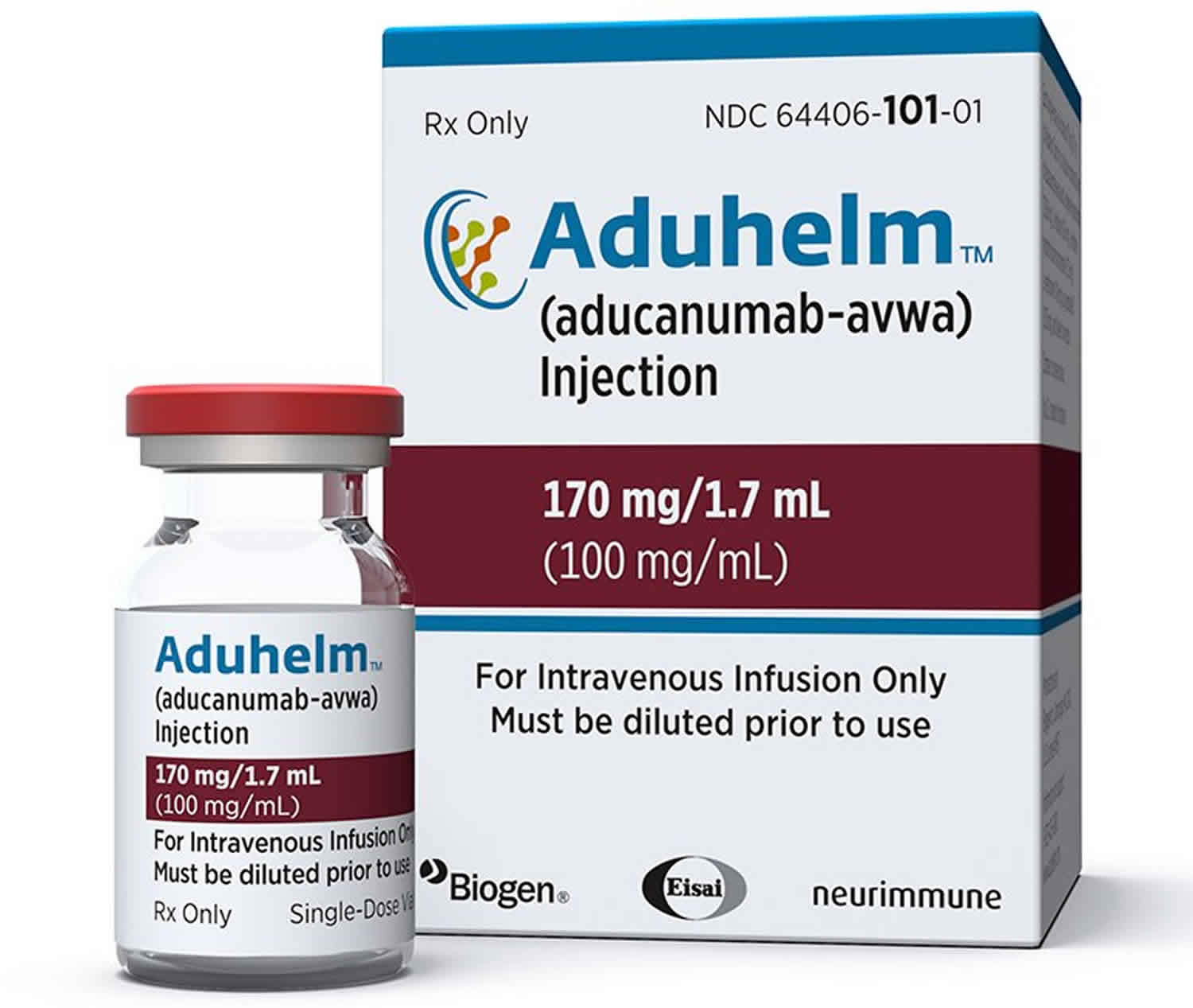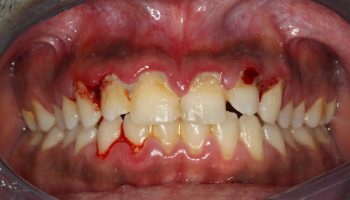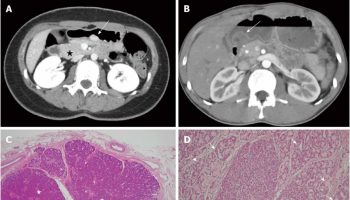Aducanumab
Aducanumab also known as aducanumab-avwa that is marketed as Aduhelm, is a human monoclonal antibody that is designed to target and remove beta-amyloid for the treatment of Alzheimer’s disease 1. Aducanumab is a recombinant human antibody that was derived from a blood lymphocyte (B cells) library collected from a healthy donor population of elderly subjects either lacking signs of cognitive impairment or with unusually slow cognitive decline 2. Aducanumab is an amyloid-beta (Aβ) antibody that targets Aβ aggregates including insoluble fibrils and soluble oligomers, by binding to the amino-terminus of beta-amyloid at residues 3–7 in a shallow pocket in the antibody 3. On Monday, June 7, 2021, Aducanumab (Aduhelm) is approved by the U.S. Food and Drug Administration (FDA) under the accelerated approval pathway, which provides patients with a serious disease earlier access to drugs when there is an expectation of clinical benefit despite some uncertainty about the clinical benefit 4. Continued approval for this indication may be contingent upon verification of clinical benefit in confirmatory trial(s). Aducanumab (Aduhelm) works by targeting beta-amyloid, a microscopic protein fragment that forms in the brain and accumulates into plaques. These plaques disrupt communication between nerve cells in the brain and may also activate immune system cells that trigger inflammation and devour disabled nerve cells. While scientists aren’t sure what causes cell death and tissue loss during the course of Alzheimer’s disease, amyloid plaques are one of the potential contributors. The discovery that certain early-onset familial forms of Alzheimer’s disease are caused by mutations in the transmembrane amyloid precursor protein (APP) that lead to enhanced production of amyloid-beta (Aβ) peptides strongly suggested that amyloidogenic Aβ is intimately involved in the Alzheimer’s disease pathogenic process 5. The Aβ peptide is the product of the proteolytic cleavage of amyloid precursor protein (APP) by two proteases (beta- and gamma-secretases), generating two principal forms of the peptide, Aβ1-40 and Aβ1-42, though an assortment of N-terminally truncated forms is also observed 6. Insoluble Aβ fibrils form the core of amyloid plaques, which, along with tau neurofibrillary tangles, represent one of the main pathological hallmarks of Alzheimer’s disease 7. Aβ42-containing forms are more neurotoxic, aggregate faster and dominate in plaques of Alzheimer’s disease patients. Both soluble Aβ oligomers and insoluble Aβ fibrils may play important roles in the pathogenesis and progression of Alzheimer’s disease 8.
Aducanumab (Aduhelm) is the first therapy to demonstrate that removing beta-amyloid resulted in better clinical outcomes 9.
- Aducanumab (Aduhelm) was shown in clinical trials to delay the clinical decline of people living with early Alzheimer’s disease (mild cognitive impairment (MCI) due to Alzheimer’s or mild Alzheimer’s dementia).
- Some people who received Aducanumab (Aduhelm) experienced significant benefits on measures of cognition and function. Examples include abilities such as memory, orientation and language.
- Some also experienced benefits on activities of daily living, which refers to the everyday skills we need to take care of ourselves and live well independently. Conducting personal finances, performing household chores (such as cleaning, shopping and doing laundry) and independently traveling out of the home are all examples of activities of daily living.
In clinical trials, the most common side effects were ARIA-E (abnormal brain changes associated with anti-amyloid treatments — most often swelling in the brain — that are spotted with neuroimaging techniques like MRI), headache, ARIA-H (micro hemorrhage/superficial siderosis) and fall.
The FDA is not directly requiring any specific diagnostic test. However, the label says the treatment is indicated for the treatment of Alzheimer’s disease, based on reduction in amyloid beta plaques, one of the hallmarks of the disease and required for an Alzheimer’s diagnosis. This means that a physician should confirm the presence of amyloid plaques in the brain before prescribing this anti-amyloid plaque treatment. Confirmatory tests like cerebral spinal fluid analysis or amyloid PET imaging should be a part of the diagnostic process to determine eligibility for the treatment.
When will Aducanumab (Aduhelm) be available at my doctor?
Now that Aducanumab (Aduhelm) is approved, nationwide distribution and implementation will take some time.
How do I receive Aducanumab (Aduhelm) treatment?
If you or a loved one is experiencing memory changes, the Alzheimer’s Association strongly encourages speaking with a health care provider for a thorough evaluation and diagnosis. Aducanumab may be a treatment option.
How is Aducanumab (Aduhelm) administered?
Aducanumab is administered intravenously (IV) via a 45- to 60-minute infusion every 4 weeks. Infusion can be done at hospitals or infusion therapy centers, and can even be administered at a person’s home by specialized nurses.
Is Aducanumab (Aduhelm) a cure for Alzheimer’s and all other dementia?
No. Aducanumab (Aduhelm) — the branded drug from Biogen — is the first treatment approved for Alzheimer’s since 2003 and the first to address the underlying biology of the disease. According to the FDA, the reduction in amyloid plaques, one of the hallmarks found in the brains of individuals living with Alzheimer’s, is reasonably likely to lead to a reduction in the clinical decline due to the disease.
This could mean more time for individuals to actively participate in daily life, have sustained independence and hold on to memories longer. We encourage people who are interested in learning more about this treatment, for themselves or a loved one, to have a conversation with their health care provider.
Aducanumab was studied in people living with early Alzheimer’s disease and mild cognitive impairment (MCI) due to Alzheimer’s who showed evidence of a buildup of amyloid plaques in the brain. The therapy has not yet been tested on people with more advanced cases of dementia.
Will Aducanumab (Aduhelm) restore memories or cognitive function that has been lost?
There is no evidence that aducanumab can restore lost memories or cognitive function.
What is mild cognitive impairment?
Mild cognitive impairment (MCI) is an early stage of memory loss or other cognitive ability loss in individuals who maintain the ability to independently perform most activities of daily living.
Aducanumab clinical trial
Aducanumab has been developed and tested over many years. In a Biogen-sponsored Phase 1b clinical trial (PRIME) of Aducanumab in prodromal and mild Alzheimer’s disease patients, a striking reduction in amyloid plaques as measured by positron emission tomography (PET) was reported following one year of monthly intravenous antibody infusions at doses ranging from 3 to 10 mg/kg 2. This effect was accompanied by a slowing of clinical decline, as measured by Mini-Mental State Examination (MMSE) and Clinical Dementia Rating scale Sum of Boxes score (CDR-SB). Two final-stage, phase III clinical trials called, ENGAGE and EMERGE, were designed to evaluate the potential benefits and assess the safety of aducanumab in people with a confirmed diagnosis of mild cognitive impairment (MCI) or mild Alzheimer’s disease. The trials involved over 3000 people who took part in the study at sites across the US and Europe. In the Phase III clinical trials, EMERGE and ENGAGE, aducanumab was administered by IV once every four weeks over a period of 78 weeks using titration protocols. The clinical trials for aducanumab exclusively enrolled participants with early memory changes and abnormal amyloid buildup confirmed through positron emission tomography (PET). This allowed researchers to monitor participants’ amyloid levels and measure changes over the course of the trial to determine whether the treatment reduced amyloid. Just as critical, researchers used a variety of cognitive assessments, participant reports and caregiver reports, as well as medical examinations, to learn whether aducanumab would provide a clinical benefit.
In March, 2019, Biogen and Eisai, another pharmaceutical company who collaborated on the drug, announced that they would stop the two phase-III trials of aducanumab early, on the basis of interim futility analyses from two identically designed, phase 3 randomized controlled trials—EMERGE and ENGAGE 10. An initial analysis suggested that the trials were unlikely to improve people’s memory and thinking sufficiently by the end of the trial. In a stunning subsequent announcement in October, the company reversed course, indicating they would be now be seeking US Food and Drug Administration (FDA) approval of aducanumab on the basis of analyses of a larger dataset from the trials. They say this shows that aducanumab not only reduces amyloid in the brain but can also slow the decline of memory and thinking skills and people’s ability to carry out activities of daily life. The new findings were apparently a result of people having taken aducanumab over a longer period of time than when they ran the earlier analysis. The results they have presented so far suggest that higher doses of the drug are important for a clinical effect. On Dec 5, 2019, results from both randomized controlled trials were presented at the 12th Clinical Trials on Alzheimer’s Disease conference in San Diego (CA, USA).
One of the two phase III trials of Aducanumab, EMERGE trial, unlike ENGAGE, showed reduced symptoms of cognitive and functional decline, along with improvements in activities of daily living, possibly reflecting the effects of higher accumulated doses of the aducanumab antibody 11. However, it remains to be determined whether Aducanumab is a disease-modifying therapy that achieves significant clinical benefits in Alzheimer’s disease patients 12. The interpretation of the cognitive data from these trials is complex, given that dosing was altered or stopped during the trial, and the magnitude of the cognitive effect was relatively small. Sevigny et al 2 demonstrated 50% plaque reduction in 9.5–15.5-month-old amyloid precursor protein (APP) mutant Tg2576 mice after treating with a mouse IgG2a Aducanumab analog; however, the effects of the immunotherapy on behavioral read-outs in mouse models have not been reported. To read the rest of the clinical trials submitted to the FDA please go here: https://www.accessdata.fda.gov/drugsatfda_docs/nda/2021/Aducanumab_BLA761178_Dunn_2021_06_07.pdf
Aducanumab price and cost
Biogen has established the price of Aducanumab (Aduhelm) based on the overall value the treatment is expected to bring to patients, caregivers, and society, while reflecting key principles such as innovation, access and sustainability. The “wholesale acquisition cost” of Aducanumab (Aduhelm), which is an infusion once every four weeks, is $4,312 per infusion for a patient of 74 kg–the average weight of a U.S. patient with mild cognitive impairment (MCI) or mild dementia 13. The wholesale acquisition cost of Aducanumab (Aduhelm) is a list price and not the net price or the price paid by patients with insurance. The out-of-pocket cost for patients with insurance will vary depending on their coverage. The yearly cost at the maintenance dose (10 mg/kg) would be $56,000 13. The cost during the first year of treatment will be lower due to the titration period.
According to Biogen and Eisai, they are committed to providing access to Aducanumab (Aduhelm) for patients across a spectrum of financial situations. For qualified, commercially insured Aducanumab (Aduhelm) patients, co-pay and infusion cost assistance programs may reduce out-of-pocket costs to as low as $0 13. Patients who are covered by Medicare through a Medicare Advantage plan have a maximum annual out-of-pocket cap 13. Most traditional fee-for-service Medicare enrollees also have secondary coverage (e.g., Medicaid or a supplemental Medigap plan) that limit out-of-pocket expenses. Medicaid patients have nominal co-pays 13.
Aducanumab dosage
Aducanumab (Aduhelm) is given through a needle placed in your vein (intravenous (IV) infusion) in your arm. Aducanumab (Aduhelm) is given every 4 weeks and at least 21 days apart. Each infusion will last about 1 hour 14.
Aducanumab (Aduhelm) titration is required for treatment initiation. The recommended maintenance dosage is 10 mg/kg administered as an intravenous infusion over approximately one hour every four weeks. Obtain a recent (within one year) brain magnetic resonance imaging (MRI) prior to initiating treatment. Obtain MRIs before the 7th infusion (first dose of 10 mg/kg) and 12th infusion (sixth dose of 10 mg/kg). If 10 or more new incident micro-hemorrhages or >2 focal areas of superficial siderosis (radiographic severe ARIA-H) is observed, treatment may be continued with caution only after a clinical evaluation and a follow-up MRI demonstrates radiographic stabilization (i.e., no increase in size or number of ARIA-H)
Aducanumab (Aduhelm) Dosage Forms and Strengths 14:
- Injectable solution:
- 100 mg/mL (170 mg/1.7 mL) solution in a single-dose vial
- 100 mg/mL (300 mg/3mL) solution in a single-dose vial
- Dilution in 100 mL of 0.9% Sodium Chloride Injection, USP, is required prior to administration.
- Administer as an intravenous infusion over approximately one hour via a 0.2 or 0.22 micron in-line filter. After an initial titration, the recommended dosage of Aducanumab (Aduhelm) is 10 mg/kg.
Aducanumab (Aduhelm) dosing titration schedule:
- Infusions 1 and 2: 1 mg/kg IV every 4 Weeks
- Infusions 3 and 4: 3 mg/kg IV every 4 Weeks
- Infusions 5 and 6: 6 mg/kg IV every 4 Weeks
- Infusion 7 and beyond: 10 mg/kg IV every 4 Weeks
Renal or hepatic impairment
- No studies were conducted to evaluate pharmacokinetics in patients with renal or hepatic impairment
- Not expected to undergo renal elimination or metabolism by hepatic enzymes
What should I do if I forget a dose?
If an infusion is missed, resume administration at the same dose as soon as possible. Infusions are to be administered every 4 weeks and at least 21 days apart.
Aducanumab side effects
Aducanumab (Aduhelm) can cause serious side effects including 15: Amyloid Related Imaging Abnormalities or “ARIA”. Amyloid Related Imaging Abnormalities (ARIA) is a common side effect that does not usually cause any symptoms but can be serious. Amyloid Related Imaging Abnormalities (ARIA) is most commonly seen as temporary swelling in areas of the brain that usually resolves over time. Some people may also have small spots of bleeding in or on the surface of the brain with the swelling. Although most people with swelling in areas of the brain do not have symptoms, some people may have symptoms such as:
- headache,
- confusion,
- dizziness,
- vision changes,
- nausea.
Enhanced clinical vigilance for ARIA is recommended during the first 8 doses of treatment with Aducanumab (Aduhelm), particularly during titration. If a patient experiences symptoms which could be suggestive of ARIA, clinical evaluation should be performed, including magnetic resonance imaging (MRI) scans if indicated.
The patient’s healthcare provider will do magnetic resonance imaging (MRI) scans before and during treatment with Aducanumab (Aduhelm) to check for amyloid related imaging abnormalities (ARIA). Patients should call their healthcare provider or go to the nearest hospital emergency room right away if they have any of the symptoms listed above.
The most common side effects of Aducanumab (Aduhelm) include 15:
- Swelling in areas of the brain, with or without small spots of bleeding in or on the surface of the brain [Amyloid Related Imaging Abnormalities (ARIA)]. Majority of ARIA observed during first 8 doses, particularly during titration; enhanced clinical vigilance recommended
- Amyloid-related imaging abnormalities-edema (ARIA-E) (35%)
- Headache (21%)
- ARIA-H microhemorrhage (19%)
- ARIA-H superficial siderosis (15%)
- Falls (15%)
- Diarrhea (9%)
- Confusion/delirium/altered mental status/disorientation (8%)
Patients should call their healthcare provider for medical advice about side effects. Patients may report side effects to FDA at 1-800-FDA-1088.
Before receiving Aducanumab (Aduhelm), patients should tell their healthcare provider about all of their medical conditions, including if:
- they are pregnant or plan to become pregnant. It is not known if Aducanumab (Aduhelm) will harm your unborn baby. Tell your healthcare provider if you become pregnant during your treatment with Aducanumab (Aduhelm).
- they are breastfeeding or plan to breastfeed. It is not known if Aducanumab (Aduhelm) passes into your breast milk. Talk to your healthcare provider about the best way to feed your baby while receiving Aducanumab (Aduhelm).
Serious allergic reactions such as swelling of the face, lips, mouth, or tongue and hives have happened during an Aducanumab (Aduhelm) infusion 15. Patients should tell their healthcare provider if they have any of the symptoms of a serious allergic reaction during or after an Aducanumab (Aduhelm) infusion.
References- Alexander GC, Emerson S, Kesselheim AS. Evaluation of Aducanumab for Alzheimer Disease: Scientific Evidence and Regulatory Review Involving Efficacy, Safety, and Futility. JAMA. 2021;325(17):1717–1718. doi:10.1001/jama.2021.3854
- Sevigny J, Chiao P, Bussière T, Weinreb PH, Williams L, Maier M, Dunstan R, Salloway S, Chen T, Ling Y, O’Gorman J, Qian F, Arastu M, Li M, Chollate S, Brennan MS, Quintero-Monzon O, Scannevin RH, Arnold HM, Engber T, Rhodes K, Ferrero J, Hang Y, Mikulskis A, Grimm J, Hock C, Nitsch RM, Sandrock A. The antibody aducanumab reduces Aβ plaques in Alzheimer’s disease. Nature. 2016 Sep 1;537(7618):50-6. doi: 10.1038/nature19323. Update in: Nature. 2017 Jun 21;546(7659):564.
- Arndt JW, Qian F, Smith BA, Quan C, Kilambi KP, Bush MW, Walz T, Pepinsky RB, Bussière T, Hamann S, Cameron TO, Weinreb PH. Structural and kinetic basis for the selectivity of aducanumab for aggregated forms of amyloid-β. Sci Rep. 2018 Apr 23;8(1):6412. doi: 10.1038/s41598-018-24501-0
- Aducanumab (marketed as Aduhelm) Information. https://www.fda.gov/drugs/postmarket-drug-safety-information-patients-and-providers/aducanumab-marketed-aduhelm-information
- Selkoe DJ, Abraham CR, Podlisny MB, Duffy LK. Isolation of low-molecular-weight proteins from amyloid plaque fibers in Alzheimer’s disease. J Neurochem. 1986 Jun;46(6):1820-34. doi: 10.1111/j.1471-4159.1986.tb08501.x
- Bayer TA, Wirths O. Focusing the amyloid cascade hypothesis on N-truncated Abeta peptides as drug targets against Alzheimer’s disease. Acta Neuropathol. 2014;127(6):787-801. doi: 10.1007/s00401-014-1287-x
- Selkoe DJ, Hardy J. The amyloid hypothesis of Alzheimer’s disease at 25 years. EMBO Mol Med. 2016 Jun 1;8(6):595-608. doi: 10.15252/emmm.201606210
- Polanco JC, Li C, Bodea LG, Martinez-Marmol R, Meunier FA, Götz J. Amyloid-β and tau complexity – towards improved biomarkers and targeted therapies. Nat Rev Neurol. 2018 Jan;14(1):22-39. doi: 10.1038/nrneurol.2017.162
- Medications for Memory, Cognition and Dementia-Related Behaviors. https://www.alz.org/alzheimers-dementia/treatments/medications-for-memory
- Beyond amyloid: New approaches to Alzheimer’s disease treatment. (2020). EBioMedicine, 51, 102648. https://doi.org/10.1016/j.ebiom.2020.102648
- Schneider L. A resurrection of aducanumab for Alzheimer’s disease. Lancet Neurol. 2020 Feb;19(2):111-112. doi: 10.1016/S1474-4422(19)30480-6
- Howard R, Liu KY. Questions EMERGE as Biogen claims aducanumab turnaround. Nat Rev Neurol. 2020 Feb;16(2):63-64. doi: 10.1038/s41582-019-0295-9
- Biogen and Eisai launch multiple initiatives to help patients with Alzheimer’s disease access ADUHELM™. June 7, 2021, Investor Relations. https://investors.biogen.com/news-releases/news-release-details/biogen-and-eisai-launch-multiple-initiatives-help-patients
- ADUHELM™ (aducanumab-avwa) injection, for intravenous use Initial U.S. Approval: 2021. HIGHLIGHTS OF PRESCRIBING INFORMATION. https://www.biogencdn.com/us/aduhelm-pi.pdf
- ADUHELM (aducanumab-avwa) MEDICATION GUIDE. https://www.biogencdn.com/us/aduhelm-medication-guide.pdf





